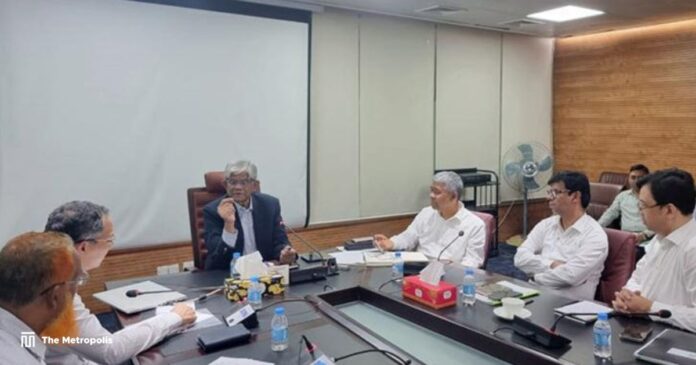The National Board of Revenue, or NBR, has been encouraged by Finance Advisor Salehuddin Ahmed to raise the tax-to-GDP ratio in order to obtain the money required to maintain Bangladesh’s development and weather the current economic downturn.
He informed the internal revenue officials on Tuesday, “We can’t keep relying on loans all the time.”
The officials have been informed by me that we must increase the tax-to-GDP ratio. For our own needs, a sizable sum of money is required. At a press conference, he stated, “We cannot always rely on loans.
For the first time since being named an advisor to the interim administration, the former governor of the central bank made a visit to the Revenue Building in Agargaon, Dhaka.
The finance expert did, however, also stress how crucial it is to make sure that the public is not subjected to unnecessary hardship in the process of increasing revenue collection.
“Revenue is our most important issue,” stated Salehuddin. The National Board of Revenue is crucial to the growth of Bangladesh’s business and industry. Their responsibility is to gather revenue, but it should be maximized in a methodical manner that spares people from suffering.
According to a meeting participant, Salehuddin suggested that NBR contemplate lowering and rationalizing the tariffs on imports of potatoes, soybean oil, other edible oils, sugar, fertilizers, and pesticides in order to alleviate the pain of the general population and offer respite from the continuous high inflation.
With a current tax-to-GDP ratio of roughly 7.6 percent, Bangladesh is among the nations with the lowest rates. For a long time, experts have suggested raising it to 15%.
Bangladesh charges high tariffs and additional duties as a result of low tax collection, which economists think deters investment.
He stated at the briefing that officials should make sure they do not erect obstacles to imports and exports.
“Goods from the private sector should be expeditiously processed from ports due to their problems. We have to make sure clients get their stuff on time.
“There are times when companies come to the port and file their bill of entry, and these tasks need to be finished on schedule,” he continued. They will request documents if they are missing, but they shouldn’t hang onto them. Goods should be expedited for importers and exporters. Any barriers erected by the government ought to be lifted.
“Forcing those who pay taxes and letting those who don’t pay off the hook—this won’t work anymore,” the finance advisor said in response to authorities’ concerns about harassment.
He responded, “I won’t say anything about it now,” when asked if the clause intended to prolong the practice of whitening black money. It’s not as though we haven’t talked about it.
In light of the recent violent and disruptive protests in July and August that disrupted corporate operations and revenue, questions were directed at newly appointed NBR Chairman Md Abdur Rahman Khan about how the “sky-high” revenue collection target for the 2024–25 fiscal year would be met.
In response, he said, “We’ll do all in our power to meet the goal. Our revenue warriors put up a lot of effort. They are capable of doing the task. We’ll collaborate with everyone.
In order to stop tax avoidance, he also emphasized that it will be closely monitored.
We’ll make sure there aren’t any leaks. Today, we received instructions from [the advisor]. We need to put in a lot of effort to ensure that the revenue is collected on time.
Reducing port clearance delays would promote taxpayer confidence, according to the NBR chief, who also ordered “quick service” to increase tax collection.
“We will collect revenue from businesses by taking them in confidence,” he declared. We think we can accomplish our target”
Advisor Salehuddin stated, “We are looking into” the US Treasury Department’s offer of technical support to enlarge the NBR. The British high commissioner, however, has also suggested changes to the foreign exchange market. We’ll confer with our regional authorities. Why should we search elsewhere if they possess the required knowledge and skills?
In response to criticism that previous reform attempts over the previous fifteen years had not been comprehensive or successful, Salehuddin said, “This time, we will undertake reforms in a holistic approach.”
The US Treasury Department’s proposal was accompanied by a presentation outlining their plan to assist Bangladesh in boosting revenue collection through the adoption of global best practices, the revision and enforcement of legislation, the removal of compliance concerns, the promotion of equity in revenue administration, and guaranteeing transparency.



